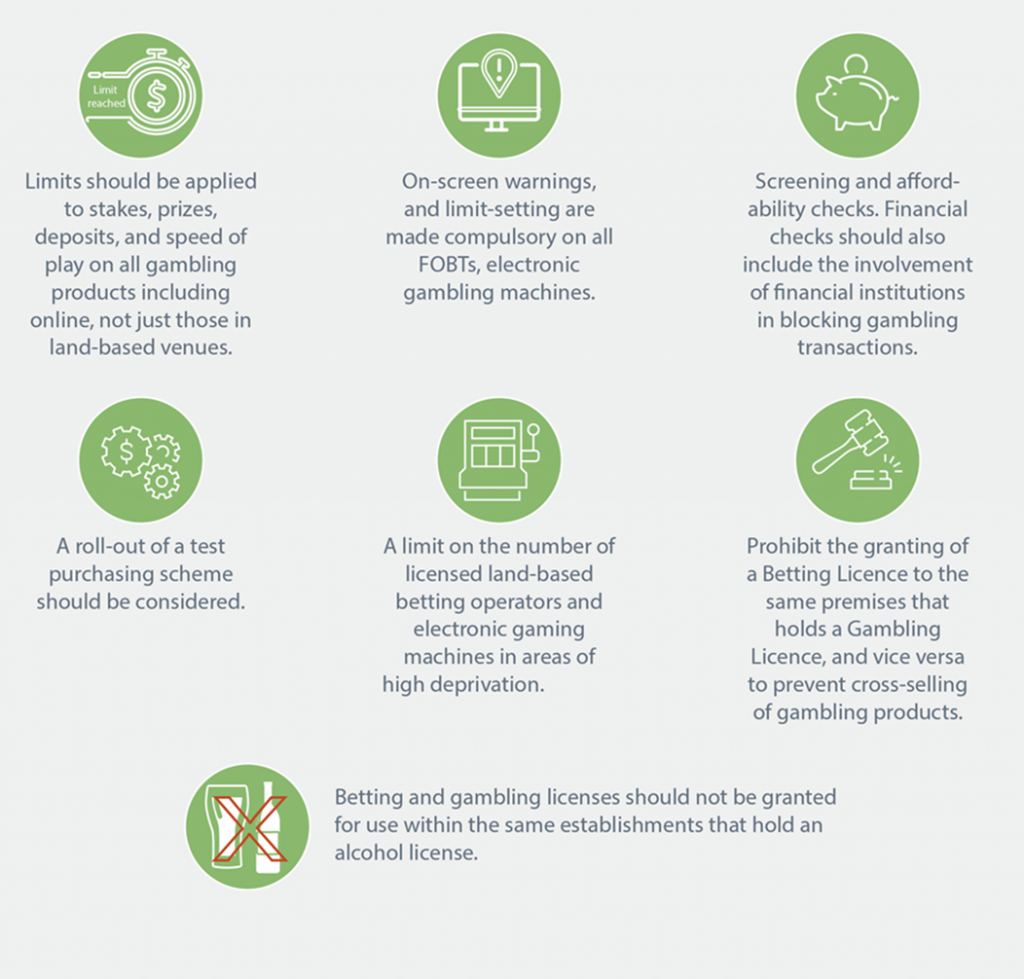
To mark Men’s Health Week (13 June-19 June), the Institute of Public Health (IPH) looks at what current data and evidence can tell us about the higher odds of gambling rates, risks, and harms among men and boys.
Available data on gambling prevalence rates in Ireland and Northern Ireland, as well as in other jurisdictions, show that boys and men are more likely to gamble than women and also have higher rates of at-risk or problem-gambling behaviours.
Over the past two years, members of the IPH policy team have presented evidence to the Northern Ireland All Party Group on Reducing Harm Related to Gambling, to the Committee for Communities on the Betting, Gaming, Lotteries and Amusements (Amendment) Act (Northern Ireland) 2022, and to the Oireachtas Committee on Justice on the 2021 General Scheme of the Gambling Regulation Bill in Ireland.
In this blog, policy team members, Louise O’Connor, Ciara Reynolds and Joanna Purdy share their insights on what the evidence says, the current legislative context, and potential policy options.
Gambling patterns in men and boys in Ireland and Northern Ireland
According to the 2016 Northern Ireland Gambling Prevalence Survey, men (70.5%) were more likely to have gambled in the previous year than women (64.1%) (1).
The survey provides data on gambling prevalence, public attitudes to gambling, the overall rate of at-risk and problem gambling and gambling methods used.
Some of the key findings from the 2016 survey include:
- A higher percentage of men compared with women were categorised as ‘moderate risk gamblers’ (7.1% v 2.8%) and ‘problem gamblers’ (4.6% v 0.2%)
- Men had a more favourable attitude towards gambling compared women (41.4% v 25.6%)
- Men (20.8%) were almost twice as likely to gamble ‘online’ as female respondents (10.7%)
- In terms of overall spend on gambling, men spent over twice the estimated average weekly spend (£12.64) compared with women (£4.65).
Data specifically on gambling prevalence rates, risks, and harms among young people in Northern Ireland is not currently available. However, data on youth gambling in the UK shows similar trends to that reported in Ireland (2).
Available data in Ireland shows that boys and men have higher rates of gambling generally, as well as higher rates of online gambling, at-risk gambling and problem-gambling.
The data sources include the European School Survey Project on Alcohol and Other Drugs (15/16-year-olds), longitudinal data from the Growing Up in Ireland Survey (17/18-year-olds and 20-year-olds) and the National Drug and Alcohol Survey (adults) published by the Health Research Board (3, 4).
Some limitations are evident, however, within currently available datasets:
- Populations that are more vulnerable to gambling-related harms are not always included,
- Stigma and reliance on self-reported data may contribute to an underreporting of gambling-related harms
- Cross-sectional prevalence surveys do not capture the episodic nature of disordered gambling or the harms experienced beyond the individual,
- The Problem Gambling Severity Index (PGSI) can reliably detect gambling disorders but is less appropriate for measuring individuals ‘at-risk’ of problematic gambling, who account for 85% of the burden of gambling harm,
- Data on gambling prevalence rates is often outdated by the time it is published, highlighting the need for real-time industry data.
Gambling behaviours and exposure
There is a lack of data on factors relating to gambling behaviours and intentions in boys and men in Ireland and Northern Ireland.
Studies in Great Britain and the United States suggest that some potential reasons for increased levels of gambling in boys and men include the following:
- Risk-taking and sensation-seeking: A study examining gender differences for gambling engagement and gambling problems found that men took more risks and had higher rates of sensation-seeking than women (5). Greater risk-taking and more sensation-seeking were related to more gambling (5).
- Social norms: One study showed that some men felt the need to demonstrate their masculinity through acts that were sensation-seeking and risk-taking. It found that gambling, particularly high stakes gambling, may provide men with the opportunity to do this (5).
Sports: Another study in Britain found that men were more likely to be sports fans, making them more likely to start betting on games (6). In some sports, commercial breaks during games may feature adverts encouraging viewers to start gambling. For example, 95% of ad breaks during live football matches in Britain featured at least one gambling advert (6). It is estimated that British men will watch an average of about 20,000 hours of televised sport throughout their lifetime, with football being by far the most watched. By contrast, women will watch about half that amount (6).

Gambling legislation in Ireland and Northern Ireland
How the gambling sector is regulated, in Ireland and Northern Ireland, is changing.
In Northern Ireland, a two-phased approach is being adopted to reform gambling legislation.
The Betting, Gaming, Lotteries and Amusements (Amendment) Act (Northern Ireland), enacted this year, creates new offences in relation to allowing children to play gaming machines; creates the power to impose a statutory levy on gambling operators; creates the power to issue a code of practice for gambling operators; makes gambling contracts enforceable in law; and permits Bookmakers and Bingo clubs to open on Sundays and Good Friday. Phase two of the legislative reform will include a new regulatory framework to regulate online gambling, including gaming machines.
In Ireland, there is currently a fragmented approach to regulation with different Acts covering betting, tote betting, gaming and lotteries, although the Department of Justice is progressing proposals to reform gambling laws.
In 2013, the Government published the General Scheme of the Gambling Control Bill to replace all existing gaming and betting legislation, however, this Bill never progressed. Since then, there have been some amendments made to existing legislation but large legislative gaps remain, including the regulation of online gambling.
The Department of Justice has since published the General Scheme of the Gambling Regulation Bill committing to the establishment of a new Gambling Regulatory Authority of Ireland focused on public safety and well-being. The Bill will apply to online and in-person gambling and will also regulate advertising, gambling websites, and apps.
The Minister for Justice has indicated that the legislation will progress with a view to establishing the new Gambling Regulatory Authority in 2023.
Some of the Institute’s observations to the Committee on Justice feature in the recently published Report on Pre-Legislative Scrutiny of the General Scheme of the Gambling Regulation Bill.
Policy and Research
Given the gaps that exist, there is an opportunity to prioritise the following areas for research and policy development on the island of Ireland.
Protection of Children
Sport plays an important role in public health – promoting physical activity, child development, weight management and mental health. There is sufficient evidence to support policies, restricting advertising that promotes gambling goods and services on TV, radio, and online channels and phasing out gambling industry sponsorship for sports clubs and national governing bodies of sports. Evidence also supports the need for better age verification measures on gambling websites and apps. Consideration should also be given to rolling out a test purchasing scheme.
Regulation
The extent and severity of gambling-related harms warrant stronger regulation. Ireland is moving forward with the appointment of a Regulator. An independent regulatory authority in Northern Ireland would strengthen the response to gambling harm. A regulator should have sufficient resources and powers for monitoring and enforcement.
The infographic below highlights some specific regulatory measures that can help reduce gambling-related harms.

Gambling data
Regular monitoring of gambling activity across the island of Ireland is essential to keep pace with the ever-evolving gambling industry. For example, updated estimates through a repeat of the Northern Ireland Gambling Prevalence Survey would be useful. Survey data on gambling among young people would be particularly important, as there is currently little or no national data available for this age group.
A new regulator should be invested with very wide powers of access to industry data to obtain reliable statistics and monitor regulatory performance. A data sharing agreement with the industry could be included as a licensing requirement. This data could be used for audit, research, and detection of those at risk of gambling addiction and gambling-related harms.
Gambling Levy
The Institute welcomes the Social Impact Fund which has been proposed under the General Scheme of the Gambling Regulation Bill in Ireland. A statutory levy should be used to fund gambling-specific addiction services and projects related to gambling-related harm. Decisions on the operation of a levy and the allocation of funds should remain the sole remit of government and free from commercial influence.
Recent IPH submissions and observations related to gambling
Over the past two years, IPH has provided oral and written evidence on policy and legislation related to gambling in Ireland and Northern Ireland, as follows:
- November 2020 – Response to the Inquiry into Northern Ireland Gambling Regulations by the All Party Group on Reducing Harm Related to Gambling.
- March 2021 – Response to the Department of Health for Northern Ireland consultation on the Draft Mental Health Strategy 2021-2031.
- May 2021 – Blog: New challenges in mental health – what role for enhanced regulation of gambling?
- December 2021 – Written and oral evidence presented to the Northern Ireland Assembly Committee for Communities on the Betting, Gaming, Lotteries and Amusements (Amendment) Bill.
- January 2022 – Invited written evidence submitted to the Oireachtas Committee on Justice on the General Scheme of the Gambling Regulation Bill.
- February 2022 – Response to the Northern Ireland Department for Communities consultation on Gambling Codes of Practice.
- March 2022 – Oral evidence presented to the Oireachtas Committee on Justice on the General Scheme of the Gambling Regulation Bill. A number of recommendations put forward by Institute feature in the ‘Report on Pre-Legislative Scrutiny of the General Scheme of the Gambling Regulation Bill’. Dr Helen McAvoy’s opening statement can be viewed here.
Help and support
If you or someone you know is affected by gambling, help and support is available. To access services and supports in Ireland click here; for support services in Northern Ireland visit the Public Health Agency.
References
1. Department for Communities. 2016 Northern Ireland Gambling Prevalence Survey. Belfast; 2017.
2. Gambling Commission. Young People and Gambling Survey 2019: A research study among 11-16 year olds in Great Britain. Birmingham; 2019.
3. ESPAD Group. ESPAD report 2019 results from the European School Survey Project on Alcohol and Other Drugs. Luxembourg; 2020.
4. Mongan D, Millar S, Galvin B. The 2019–20 Irish National Drug and Alcohol Survey: Main findings. Dublin; 2021.
5. Wong G, Zane N, Saw A, Chan AK. Examining gender differences for gambling engagement and gambling problems among emerging adults. J Gambl Stud. 2013;29 (2):171-89.
6. Hemmings C. Why are most problem gamblers men? BBC. 2018 13 February 2018.


